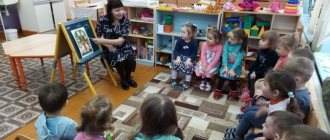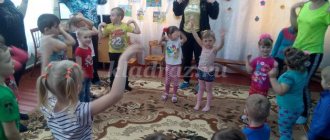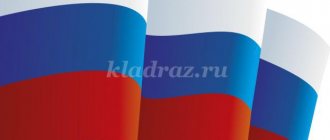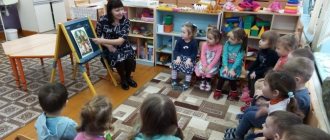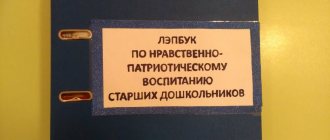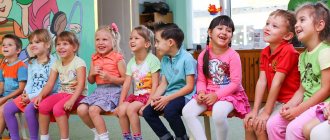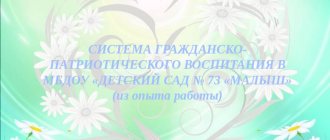MAGAZINE Preschooler.RF
Patriotic quest game “Raising a little patriot”Purpose of the game:
- To improve the work of MADOU in the civic and patriotic education of preschool children.
- To stimulate the need of teachers to demonstrate creativity and introduce new Federal State Educational Standards for the successful education of preschoolers.
- Develop the ability to discuss and agree on proposed issues.
Rules of the game:
- Take an active part in the game.
- Be able to listen to others.
- Develop a common solution to the issue.
- Maintain proper speech culture and tact.
- Do not evaluate jury scores.
PROGRESS OF THE GAME
Preschool childhood is the most important period in the formation of a person’s personality. At this age stage, the moral foundations of civic qualities are laid, and children’s first ideas about the world around them, society and culture are formed.
Patriotic education is aimed at the formation and development of an individual who has the qualities of a citizen-patriot of the Motherland and is capable of successfully fulfilling civic duties in times of peace and war. You cannot be a patriot without feeling a personal connection with your Motherland, without knowing how our ancestors, our fathers and grandfathers loved and cherished it.
Patriotism in relation to a preschool child is the need to participate in all matters for the benefit of the people around him, representatives of wildlife, the presence of such qualities as compassion, empathy, self-esteem; awareness of oneself as a part of the surrounding world.
In addition to patriotic feelings, an important element in becoming a young citizen is awareness of one’s ethnicity.
And any awareness begins with KNOWLEDGE. Knowledge about who I am, what the people are, what my people are, what their history, culture, traditions are...
1. Game “Let's stand in twos” .
Goal: distribution of players into teams.
Progress of the game: Music sounds. All players move, and the Leader calls the number 2 (4, 6). Everyone is built in pairs.
Host: You are divided into fours - these will be the teams. I invite the teams to go to their tables. Please choose your team captains and come up with a team name. According to tradition, we need to select the jury for today's game.
1. Training on creating the image “Motherland” .
I propose to create an image of the Motherland.
- close your eyes, imagine the image that appears when you hear the word “Motherland” . (teachers describe the images that arose: birch, open field, etc.);
- exchanging opinions, listening to folk songs and watching the video “Pictures of Native Nature” ;
- development of the general concept of “Motherland” ;
- selection of related words for the word “Motherland” (Motherland, clan, people, parents, portly, beard, spring).
Interesting fact: Beard is a word related to “Motherland” . It has been proven that hair contains the genetic memory of the family. Therefore, a woman wearing a braid should not cut her hair during pregnancy; through the braid, she passes on the ancestral memory to the child. No wonder the braid looks like a DNA helix. And men kept their ancestral memory in their beards. Therefore, in Rus', men always wore a beard.
Returning to the topic of our seminar “Moral and Patriotic Education” , we can say that each clan, like a people, should have a specific place, its own piece of the Motherland. This is the land from which the family tree grows. And this piece should be passed down by inheritance. It cannot be sold or exchanged. The commandments of the god Perun say: “Do not sell your land for gold and silver, for you will call curses on yourself, and you will not be forgiven all your days without a trace...” .
2. Brainstorming .
Host: And now we will do a little warm-up. Answer the questions given to you.
Questions for teachers:
- How do you understand what moral and patriotic education is? (This is the education of love for the Motherland, oneself, loved ones, and the environment).
- Formulate the goal of moral and patriotic education of preschool children. (Education of a humane, spiritual and moral personality, worthy future citizens of Russia, patriots of their Fatherland).
- Formulate the tasks of moral and patriotic education of preschool children.
- Forming a sense of attachment to your home, kindergarten, friends, your loved ones;
- Formation of a feeling of love for one’s native land, one’s small homeland based on familiarization with one’s native nature, culture and traditions;
- Formation of ideas about the Motherland as a native country, about Moscow as the capital of Russia;
- Fostering patriotism and respect for the cultural past of Russia through the means of aesthetic education: music, artistic activity, artistic expression;
- Cultivating a moral and patriotic feeling through the study of Russian state symbols.
- Fostering a sense of respect for elders.
4. Draw up a scheme for the implementation of work on moral and patriotic education with preschool children (educators are asked to fill out the schemes proposed to them. Then the Leader fills out the general scheme on the board for verification).
3. Game “Attentive Eyes” .
Host: And now we will test your powers of observation and how your moral and patriotic feelings are developed. Remember and answer the questions:
- Describe the coat of arms of Russia. (We don’t know exactly why the tsar chose a combination of white, blue and red colors. Perhaps he used the ancient coat of arms of the Moscow princes: white - St. George the Victorious, blue - the flowing cloak of the horseman, red - the background, the shield of the coat of arms.)
- How many crowns do eagles have on the coat of arms of Russia? (Three. They are yellow, and this is the color of the sun. For us, yellow has always symbolized goodness and justice)
- What does the eagle hold in its right paw? (scepter)
- What is the eagle holding in its left paw? (rod. These are symbols of power)
- What else is depicted on the coat of arms? (St. George the Victorious. Our coat of arms symbolizes the victory of good over evil)
- What is he holding in his hand? (Spear. From this spear the penny got its name)
- What shape do coats of arms have? (shield)
Host: Let's check the correctness of your answers (shows an illustration of the Coat of Arms of Russia, the coat of arms of the village).
4 "Name it correctly".
1. A special political institution that provides social
protection of the population, defense and security of the country. (State)
2. A large territory that has certain boundaries and enjoys state sovereignty. (A country)
3. What is patriotism? (Devotion and love for the Motherland, its nature, culture, people)
4. Who founded Moscow? (Prince Yuri Dolgoruky, son of the Grand Duke of Kyiv Vladimir Vsevolodovich Monamakh)
5. What custom existed in the old days when entering the Kremlin through the gates of the Spasskaya Tower? (It was necessary to remove the hat; the violator was punished by forcing him to bow to the tower fifty times)
7. "Grandma's Chest"
- Where does the Motherland begin... with fairy tales, legends, epics, nursery rhymes, proverbs, sayings... From infancy, a child hears his native speech. Works of oral folk art not only form a love for the traditions of their people, but also contribute to the development of personality in the spirit of patriotism.
— On the pieces of paper there are proverbs from other countries with modern interpretations, I suggest you read them and remember the analogue of Russian proverbs that are already familiar to you. For example:
“The head is the crown of the body, and the eyes are the best diamonds in that crown” (Azerb.) - “The eyes are the mirror of the soul . If you guessed the proverb, then one is “patriotic”
Game: “Say a proverb in Russian”
— Translate a foreign proverb or saying into Russian, find an analogue:
“When a lady gets out of a car, the car goes faster” (English) - “A woman with a cart makes it easier for a mare .
“He who asks will not get lost” (Finnish) - . ”
| Next > |
